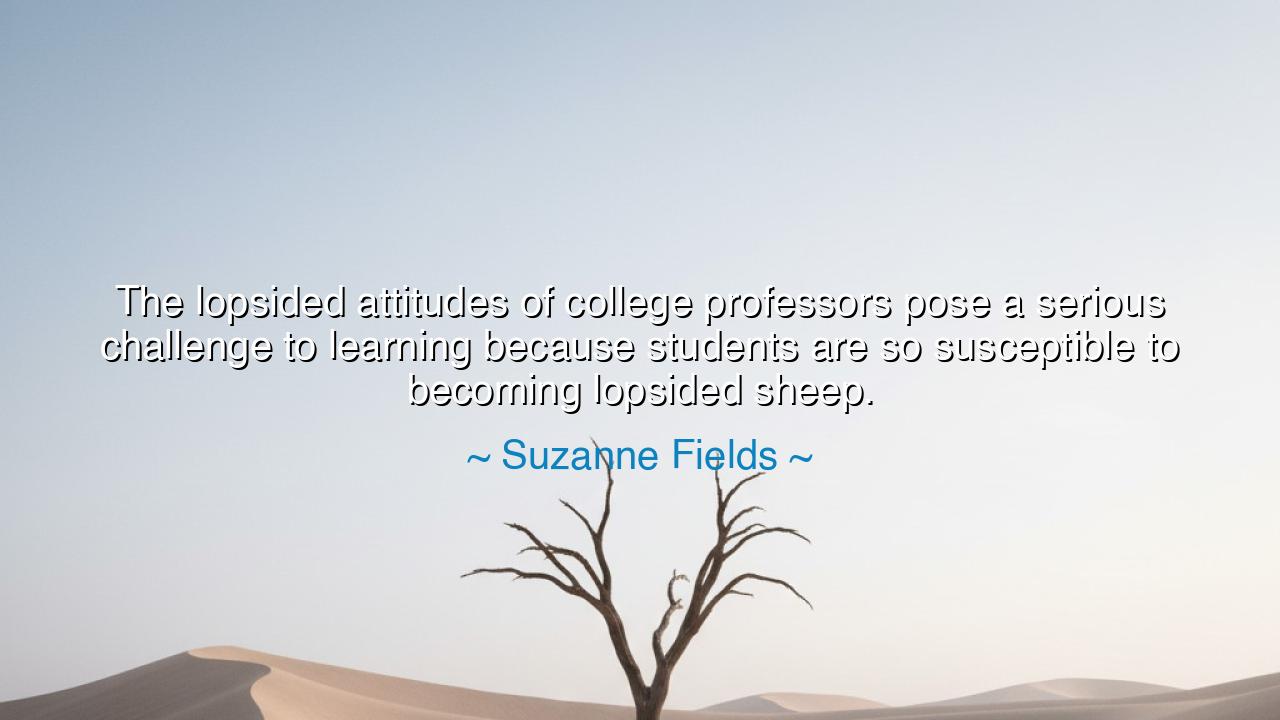
The lopsided attitudes of college professors pose a serious
The lopsided attitudes of college professors pose a serious challenge to learning because students are so susceptible to becoming lopsided sheep.






Hear the words of Suzanne Fields, who warned against the dangers of narrow thought in the halls of higher learning: “The lopsided attitudes of college professors pose a serious challenge to learning because students are so susceptible to becoming lopsided sheep.” This is not merely a critique of education, but a cry against the withering of independent thought. For she speaks of the peril that arises when those entrusted with guiding the young do not teach them to think, but to echo—when the shepherds of knowledge train not free minds but obedient flocks.
She speaks first of lopsided attitudes, the imbalance that comes when a professor, whose duty is to explore truth in its fullness, instead clings only to one perspective. In every age, imbalance blinds. The philosopher who listens only to reason neglects imagination; the ruler who listens only to flattery forgets justice. In the classroom, when the teacher leans too heavily on one side of thought, the student inherits not wisdom, but bias, not strength, but deformity. Thus, learning itself becomes warped.
She warns that students may become lopsided sheep, for youth, though eager, is also impressionable. In the ancient world, young Athenians crowded around the sophists, repeating their clever phrases without question, believing that rhetoric alone was truth. It was Socrates who broke through, asking questions that forced his listeners to think for themselves. Without such challenges, students would have remained mere echo chambers, sheep following the lopsided teaching of their masters. So too does Fields warn that without balance, today’s students risk losing the ability to discern, question, and choose for themselves.
History gives us sobering examples of this peril. In Nazi Germany, professors in universities were among the first to align their teachings with the ideology of the state. Their classrooms became breeding grounds for conformity, not inquiry. Students, trusting their mentors, absorbed prejudice as if it were wisdom, and many became the obedient servants of tyranny. Their failure was not a lack of intelligence but of independence. Here, Fields’s image of sheep is tragically fulfilled: brilliant minds reduced to blind followers.
Yet her words are not only a warning but a call to courage. For if teachers can lead students into conformity, they can also lead them into freedom. A professor who teaches with humility, presenting many sides, encouraging doubt and questioning, raises not sheep but shepherds—leaders who think with clarity, who walk with conviction. The challenge, then, is for both teacher and student: the teacher must offer balance, and the student must resist the ease of passive acceptance.
The emotional heart of her saying is this: true learning is not about agreement but about struggle. Ideas must be weighed, tested, and even opposed, if they are to be truly understood. A lopsided classroom may offer comfort, for it asks little of the mind, but it is a false comfort. Only when the student stands upright, wrestling with contradiction, does wisdom take root. To become a sheep is easy; to remain an independent thinker is hard. Yet the harder path is the nobler one.
The lesson, O seeker, is clear: beware of imbalance, whether in professors or in yourself. Demand of your teachers not only knowledge but honesty, the willingness to expose you to many truths, not just one. And in yourself, cultivate the courage to question, even when questioning brings discomfort. For the mark of wisdom is not in repeating the voice of another, but in finding your own.
What then shall you do? First, listen widely, exposing yourself to voices across the spectrum of thought. Second, practice questioning, even of ideas you find agreeable, for only then will you test their strength. Third, resist the temptation of becoming a lopsided sheep, swayed by authority without reflection. Stand as a thinker, balanced, discerning, and free.
And remember always: as Suzanne Fields declared, the danger is real, for students are vulnerable to the sway of their teachers. Yet you need not be a sheep. You may instead be a shepherd of your own mind, guided not by imbalance but by the pursuit of truth itself.






AAdministratorAdministrator
Welcome, honored guests. Please leave a comment, we will respond soon